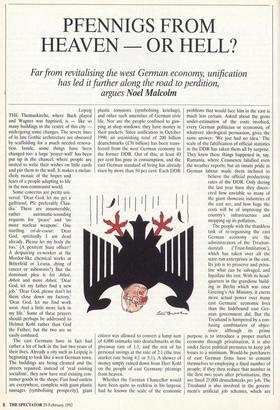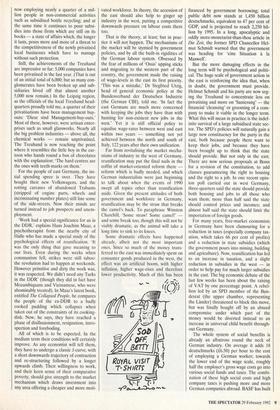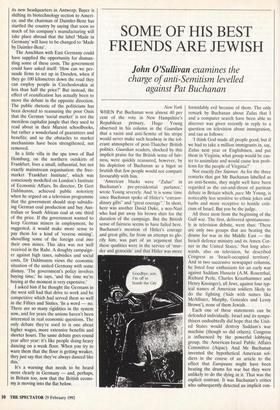PFENNIGS FROM HEAVEN OR HELL?
Far from revitalising the west German economy, unification has led it further along the road to perdition,
argues Noel Malcolm Leipzig
THE Thomaskirche, where Bach played and Wagner was baptised, is — like so many buildings in the centre of this city — undergoing some changes. The severe lines of its late Gothic architecture are obscured by scaffolding for a much needed renova- tion. Inside, some things have been changed too: a large 'prayer-wall' has been put up in the chancel, where people are invited to write their wishes on little cards and pin them to the wall. It makes a melan- choly mosaic of the hopes and fears of a people adapting to life in the non-communist world.
Some concerns are pretty uni- versal: 'Dear God, let me get a girlfriend. PS: preferably Clau- dia.' There are innumerable,
rather automatic-sounding requests for 'peace' and `no more nuclear weapons'. One startling cri-de-coeur: 'Dear God, spiritually I am dead already. Please let my body die too.' (A penitent Stasi officer? A despairing ex-worker at the Mordor-like chemical works at Bitterfeld or Leuna, dying of cancer or asbestosis?) But the dominant plea is for Arbeit, Arbeit and more Arbeit. 'Dear God, let my father find a new job.' Dear God, please don't let them close down my factory.' 'Dear God, let me find work soon. And a little more luck in my life.' Some of these prayers should perhaps be addressed to Helmut Kohl rather than God the Father; but the two are so easily confused.
The east Germans have in fact had rather a lot of luck in the last two years of their lives. Already a city such as Leipzig is beginning to look like a west German town. The buildings are being cleaned and the streets repaired; instead of 'real existing socialism', they now have real existing con- sumer goods in the shops. Fast food outlets are everywhere, complete with giant plastic sausages (symbolising prosperity), giant plastic tomatoes (symbolising ketchup), and other such amenities of German civic life. Nor are the people confined to gaw- ping at shop windows: they have money in their pockets. Since unification in October 1990, an astonishing total of 200 billion deutschmarks (£70 billion) has been trans- ferred from the west German economy to the former DDR. Out of this, at least 40 per cent has gone in consumption, and the east German standard of living has already risen by more than 50 per cent. Each DDR citizen was allowed to convert a lump sum of 4,000 ostmarks into deutschmarks at the giveaway rate of 1:1, and the rest of his personal savings at the rate of 2:1 (the true market rate being 4:1 or 5:1). A shower of money simply rained down from Herr Kohl on the people of east Germany: pfennigs from heaven.
Whether the German Chancellor would have been quite so reckless in his largesse had he known the scale of the economic problems that would face him in the east is much less certain. Asked about the gross under-estimation of the costs involved, every German politician or economist, of whatever ideological persuasion, gives the same answer: 'We just had no idea.' The scale of the falsification of official statistics in the DDR has taken them all by surprise. They knew these things happened in, say, Rumania, where Ceausescu falsified even the weather reports; but an innate pride in German labour made them inclined to believe the official productivity rates of the DDR. Only during the last year have they discov- ered how unviable so many of the giant showcase industries of the east are, and how huge the costs will be of improving the country's infrastructure and mopping up its pollution.
The people with the thankless task of re-organising the east German economy are the administrators of the Treuhan- now employing nearly a quarter of a mil- lion people in non-commercial activities such as subsidised bottle recycling; and at the same time it continues to pour subsi- dies into those firms which are still on its books — a state of affairs which, the longer it lasts, poses more and more of a threat to the competitiveness of the newly privatised local businesses which have to manage without such protection.
Still, the achievements of the Treuhand are impressive so far: 5,000 companies have been privatised in the last year. (That is out of an initial total of 6,000; but so many con- glomerates have been broken up and sub- sidiaries hived off that almost another 5,000 now remain.) In the Leipzig region, as the officials of the local Treuhand head- quarters proudly told me, a quarter of their privatisations have been management buy- outs: Diese sind Management-buy-outs.' Most of these, however, were artisan enter- prises such as small glassworks. Nearly all the big problem industries — above all, the chemical works — remain unprivatised. The Treuhand is now reaching the point where it resembles the little boy in the car- toon who hands round a box of chocolates with the explanation: 'The hard centres are the ones with teeth-marks on them.'
For the people of east Germany, the ini- tial spending spree is over. They have bought their new Volkswagens, and the rotting carcases of abandoned Trabants (stripped of engine parts, wheels and incriminating number plates) still line some of the side-streets. Now their minds are turned instead to job prospects and unem- ployment.
'Work had a special significance for us in the DDR,' explains Hans Joachim Maaz, a psychotherapist from the nearby city of Halle who has made a special study of the psychological effects of reunification. 'It was the only thing that gave meaning to our lives. Even during the weeks when communism fell, strikes were still taboo: the revolution had to happen at weekends. However primitive and dirty the work was, it was respected. We didn't need any Turks in the DDR' (though they did in fact have Mozambiquans and Vietnamese, who were abominably treated). In Maaz's latest book,
entitled The Collapsed People, he compares the people of the ex-DDR to a badly
cooked pudding which collapses when taken out of the constraints of its cooking- dish. Now, he says, they have reached a phase of disillusionment, resignation, intro- spection and foreboding.
All of which is to be expected. In the medium term their conditions will certainly improve. As any economist will tell them, they have to undergo a classic J-curve, with a short downwards trajectory of contraction and re-structuring followed by a longer upwards climb. Their willingness to work, and their keen sense of their comparative poverty, should give strength to the market mechanism which draws investment into any area offering a cheaper and more moti- vated workforce. In theory, the accession of the east should also help to ginger up industry in the west, putting a competitive downwards pressure on labour costs there too.
That is the theory, at least; but in prac- tice it will not happen. The mechanisms of the market will be stymied by government policies, and by all the built-in rigidities of the German labour system. Obsessed by the fear of millions of 'Ossis' upping sticks and migrating to the western part of the country, the government made the raising of wage-levels in the east its first priority. 'This was a mistake,' Dr Siegfried Utzig, head of general economic policy at the Bundesverband der Deutschen Industrie (the German CBI), told me. 'In fact the east Germans are much more concerned with keeping the jobs they have than with hunting for non-existent new jobs in the west.' Yet it is still official policy to equalise wage-rates between west and east within two years — something not yet achieved between the north and south of Italy, 122 years after their own unification.
Far from revitalising the market mecha- nisms of industry in the west of Germany, reunification may put the final nails in the coffin of market-oriented reform there — reform which is badly needed, and which German industrialists were just beginning to talk about when the events of 1990 swept all topics other than reunification aside. Given the present attitudes of both government and workforce in Germany, reunification may be the straw that breaks the camel's back. To paraphrase Winston Churchill, 'Some straw! Some camel!' — and some break too, though this will not be visibly dramatic, as the animal will take a long time to sink to its knees.
Some dramatic effects have happened already, albeit not the most important ones. Since so much of the money trans- ferred to the east was immediately spent on consumer goods produced in the west, the effect was an artificial boom, with higher inflation, higher wage-rises and therefore lower productivity. Much of this has been
financed by government borrowing; total public debt now stands at 1,450 billion deutschmarks, equivalent to 47 per cent of GDP, and is projected to reach 2,250 bil- lion by 1995. In a long, apocalyptic and oddly more-monetarist-than-thou article in Die Zeit, the former SPD Chancellor Hel- mut Schmidt warned that the government was heading for 'eine Situation a la Maxwell'.
But the more damaging effects in the long term will be psychological and politi- cal. The huge scale of government action in the east is reinforcing the idea that, when in doubt, the government must provide. Helmut Schmidt and his party are now urg- ing the Treuhand to concentrate less on privatising and more on `Sanierung' — the financial 'cleansing' or grooming of a com- pany to make it viable in the longer term. What this will mean in practice is the indef- inite survival of a large subsidised state sec- tor. The SPD's policies will naturally gain a large new constituency for the party in the east, both because people there want to keep their jobs, and because they have been brought up to think that the state should provide. But not only in the east. There are now serious proposals at Bonn for a revision of the constitution, to add clauses guaranteeing the right to housing and the right to a job. In one recent opin- ion poll carried out in west Germany, three-quarters said the state should provide both housing and jobs to all those who want them; more than half said the state should control prices and incomes; and almost half said the state should limit the importation of foreign goods.
For many years, free-market economists in Germany have been clamouring for a reduction in taxes (especially company tax- ation, which takes 66 per cent of profits) and a reduction in state subsidies (which the government pours into mining, building and agriculture). Now, reunification has led to an increase in taxation, and a slight reduction in subsidies in the west — in order to help pay for much larger subsidies in the east. The big economic debate of the last few weeks has been about the raising of VAT by one percentage point. A rebel- lion led by an SPD member of the Bun- desrat (the upper chamber, representing the Lander) threatened to block this move, but was finally bought off by an absurd compromise under which part of the money would be diverted instead to an increase in universal child benefit through- out Germany.
The whole system of social benefits is already an albatross round the neck of German industry. On average it adds 18 deutschmarks (£6.50) per hour to the cost of employing a German worker; towards the lower end of the wage scale, roughly half the employer's gross wage costs go into various social funds and taxes. The combi- nation of these high social costs and high company taxes is pushing more and more German companies abroad. BASF has built its new headquarters in Antwerp; Bayer is shifting its biotechnology section to Ameri- ca; and the chairman of Daimler-Benz has startled the country by saying that soon so much of his company's manufacturing will take place abroad that the label 'Made in Germany' will have to be changed to 'Made by Daimler-Benz'.
The Anschluss with East Germany could have supplied the opportunity for disman- tling some of these costs. The government could have asked itself: 'How can we per- suade firms to set up in Dresden, when if they go 100 kilometres down the road they can employ people in Czechoslovakia at less than half the price?' But instead, the effect of reunification has actually been to move the debate in the opposite direction. The public rhetoric of the politicians has been devoted to reassuring the poor Ossis that the German 'social market' is not the merciless capitalist jungle that they used to read about in their Marxist schoolbooks, but rather a wonderland of guarantees and benefits; and so the obstacles to market mechanisms have been strengthened, not removed.
In a little villa in the spa town of Bad Homburg, on the northern outskirts of Frankfurt, lives a small, influential, but not exactly mainstream organisation: the free- market 'Frankfurt Institute', which was consciously modelled on London's Institute of Economic Affairs. Its director, Dr Gert Dahlmanns, achieved public notoriety when he argued on a television programme that the government should stop subsidis- ing German coal production and buy Aus- tralian or South African coal at one third of the price. If the government wanted to keep German miners in employment, he suggested, it would make more sense to
pay them for a kind of 'reverse mining', shovelling some of the foreign coal into
their own mines. This idea was not well received in the Ruhr. A doughty campaign- er against high taxes, subsidies and social costs, Dr Dahlmanns views the economic situation of the united Germany with some dismay. 'The government's policy involves buying time,' he says, 'and the time we're buying at the moment is very expensive.'
I asked him if he thought the Germans in the west still had that drive to work and be competitive which had served them so well in the Fifties and Sixties. 'In a word — no. There are so many rigidities in the system now, and for years the unions haven't been interested in real economic questions. The only debate they're used to is one about higher wages, more extensive benefits and shorter hours. The same debate goes round year after year: it's like people doing heavy dancing on a weak floor. When you try to warn them that the floor is getting weaker, they just say that they've always danced like this.'
It's a warning that needs to be heard more clearly in Germany — and, perhaps, in Britain too, now that the British econo- my is moving into the flat below.




















































 Previous page
Previous page